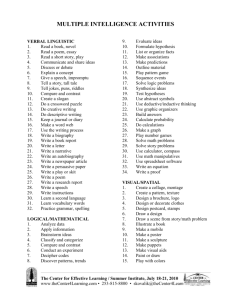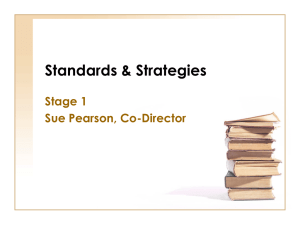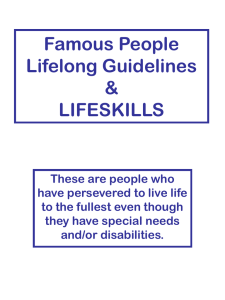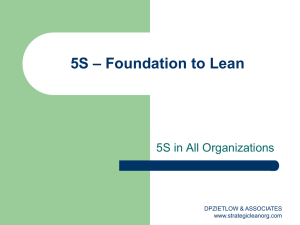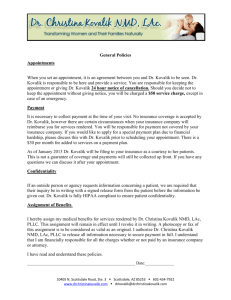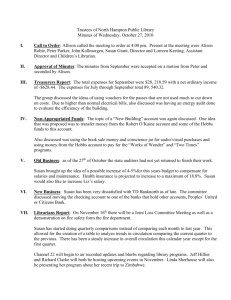Stage Two Day 2 - Sope Creek Elementary School
advertisement
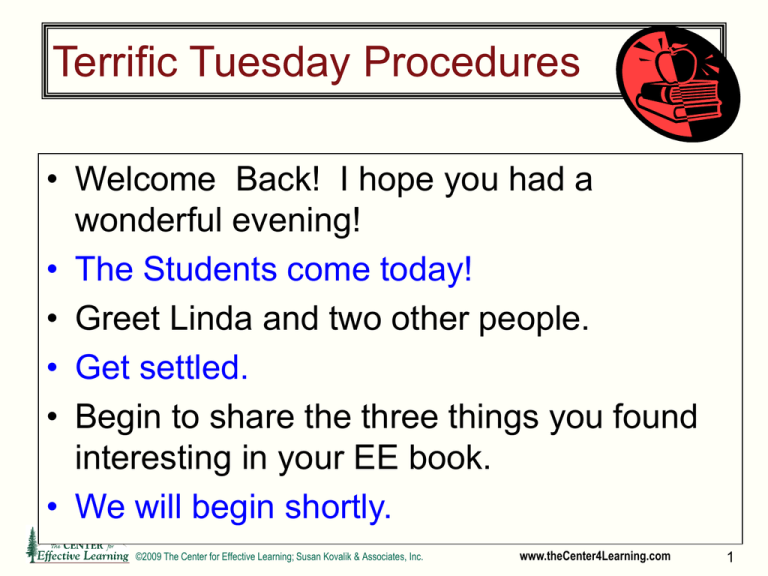
Terrific Tuesday Procedures • Welcome Back! I hope you had a wonderful evening! • The Students come today! • Greet Linda and two other people. • Get settled. • Begin to share the three things you found interesting in your EE book. • We will begin shortly. ©2009 The Center for Effective Learning; Susan Kovalik & Associates, Inc. www.theCenter4Learning.com 1 Writing HET Curriculum Welcome! PERK/Inclusion P.E.R.K. CLOSURE Being There DAY TWO Classroom Observations BREAK Debrief Observation INTELLIGENCE IS A FUNCTION OF EXPERIENCE Writing Time Sharing of Progress © Susan Kovalik & Associates, 2003 ©2009 The Center for Effective Learning; Susan Kovalik & Associates, Inc. www.theCenter4Learning.com 2 “I think, at a child’s birth, if a mother could ask a fairy godmother to endow it with the most useful gift, that gift should be curiosity.” ~ Eleanor Roosevelt ~ ©2009 The Center for Effective Learning; Susan Kovalik & Associates, Inc. www.theCenter4Learning.com 2.1 3 ©2009 The Center for Effective Learning; Susan Kovalik & Associates,Expectations Inc. Exceeding www.theCenter4Learning.com by Susan Kovalik & Karen D. Olsen pg 9.34 Sense of Belonging Activity SNOWBALL Write one of your findings from your PERK work on a piece of notebook size paper. Take you paper with you as you form a circle with the group. Wait for Linda to give you further directions. ©2009 The Center for Effective Learning; Susan Kovalik & Associates, Inc. www.theCenter4Learning.com 5 HET VOCABULARY • Year Long Theme – Curriculum Map, pacing guide • Component – Marking Period • Key Point – Standard in kid language – Conceptual, Significant Knowledge, Skill • Inquiry – Activity students do to learn the Key Point ©2009 The Center for Effective Learning; Susan Kovalik & Associates, Inc. www.theCenter4Learning.com 6 HET VOCABULARY • Kid Grabbing Title – Fun titles to hook students • Concept – Big Idea – Creates an address in the brain to send learning to • Rationale – Why teach this, this way? – Justification to: teacher, students, parents, administration ©2009 The Center for Effective Learning; Susan Kovalik & Associates, Inc. www.theCenter4Learning.com 7 Brain Compatible Elements • Meaningful Content • Choice • Mastery/Application ©2009 The Center for Effective Learning; Susan Kovalik & Associates, Inc. www.theCenter4Learning.com 8 Why Integrate? • To many standards to teach in isolation • The brain works best and remembers best with an integrated format • See the big picture not isolated factoids • Our world is integrated ©2009 The Center for Effective Learning; Susan Kovalik & Associates, Inc. www.theCenter4Learning.com 9 Curriculum Year Long Theme Creating the Pacing Guide for the Year Mini Theme Try it out on a small scale ©2009 The Center for Effective Learning; Susan Kovalik & Associates, Inc. www.theCenter4Learning.com 10 Treasures Within •Lifelong Guidelines •LIFESKILLS •How We Learn Location: Classroom Treasures of Our Heritage Treasures of Our Water MICHIGAN’S TREASURES •Treasures of the Creek •Riding the River •Great Lakes & Great • Ships •Nature’s Balance Location: Detroit River, Blakely Creek Treasures of Our Land •The Three Fires •Pondering Plants •Voyages Digging for Treasures •Fertile Fields •Culture Clash •Sifting Through the Soil •Grazing Through •Our Place in •Iron Country the the •More Underground Grass Universe Treasures •Green Gold Location: •Simple MachinesLocation: History Complex Work Farm/Forest Museum Location: Schoolyard Organizing Concept for the Theme: Knowledge is wealth and there are treasures to be found everywhere Pattern Shaper: Perspective (richness) taken from various locations in our community. E.E. p. 14.10 11 Rationale:©2009 WeThetreasure and help what we understand. Center for Effective Learning; Susan preserve Kovalik & Associates, Inc. www.theCenter4Learning.com Hospital City Council From Our Perspective From the City My Bodybrain Procedures Basic Needs Lifelong Guidelines Agenda LIFESKILLS Community Building Florence City Government Raptor Center County Park Citizens: Trees as Habitats: Natives Oak People from Other Places Chestnut International Airport Tulip Poplar Local Businesses Horse Breeding: Turfway Race Track Kentucky Derby Horse Farm The World from Organizing Concept: Diversity Pattern Shaper: Animal Citizens: • Predators: Owls and Other Raptors • Cave Dwellers: Bats From Ourselves to Our Universe Rationale: Learning about the diversity of the people, animals and plants of our neighborhood and state can help students understand their role as a responsible citizen. Where We Stand Agriculture State Universities and Colleges From the State From Boone County History of the River: • Early Settlers Ecology • Trappers and Traders of the River Cities: Transportation Routes: Frankfort - State Capital * Barges Lexington - Heart of Bluegrass * Locks Louisville - River City * Highways Harlan County - Coal Mining Frankfort Ann Ross, Susan Kovalik & Associates ©2001 ©2009 The Center for Effective Learning; Susan Kovalik & Associates, Inc. From the Owensboro Ohio River www.theCenter4Learning.com 12 Economical Geographical Locations: Local Government Offices Guests: Local Historian, Local Activist • Colorado and Urban Sprawl • Local Problems and Solutions • Exploring Possibilities Physiological~ Psychological Location: School Guest: Probation Officer • Has Anybody Seen Keys To Our Future My Brain? • Me-to-We • Class Goal Setting Yearlong Theme Concept: Balance Pattern Shaper: Systems of the world Rationale: It is only through careful study and well planned, positive action that we, as responsible citizens can preserve the geographical, economical and ecological balance needed to keep the systems of our relatively small earth in good health. ©2009 The Center for Effective Learning; Susan Kovalik & Associates, Inc. Locations: City Council, Grocery Store Guests: Dietitian, Councilperson • A Healthy Economy • Food For Thought • DNA and YOU • Energy: Spare the Switch Ecological Locations: Museum of Natural History, Habitat for Humanity Guests: Ecologist, Inventor • Footprints - Geology of Colorado • Reality Check - environmental concerns and toxic sites • Hope For the Future - safe, clean water, air and land Patty Harrington, SKA Associate www.theCenter4Learning.com 3.14 13 Water Treatment Plant Hospital Finding the Balance Within Myself 8 Smarts Natural Resources My Bodybrain Community Building Lifelong Guidelines LIFESKILLS Procedures Personality Basic Needs Concept: Balance Pattern Shaper: Kinds of Balance Rationale: Teenagers are constantly searching for balance within themselves, their lives, their peers and their world. Learning to balance their lives can help them be responsible citizens of their community. Conservation Stewardship Maintaining Perfect Balance Recycling Careers Land Animals & Water Standards/Regulations Plants Arkansas River Hazardous Wastes Arkansas River Watershed Federal/State Laws Searching for Balance in Tulsa, OK Overuse of land and water resources Native Americans Living in Balance Immigrants Citizens Haves and Have Nots Canada Green United Nations World Summit Recycling Plant Upsetting the Balance of Nature in Oklahoma Understanding the Balance of Nature World Peace Nations of the World in Balance ©2009 The Center for Effective Learning; Susan Kovalik & Associates, Inc. Searching for Balance in the United States Reservation Port of Cotoosa www.theCenter4Learning.com 3.15 14 DARK HOMES HOME AWAY FROM HOME Lifelong Guidelines LIFESKILLS The Brainy Bunch Our Class Family Location: Classroom Home Is Where Amazing Ants Wiggly Worms Grouchy Gophers Darkrooms Location: Outdoors, Photo studio the Heart Is Homes With a View Bee Hives Birds Nest Apartment Buildings Location: Outdoors CONCEPT: A Habitat is the place where the animal or plant lives while meeting its needs. PATTERN SHAPER: Habitat RATIONALE: Studying how animals and plants interact in a habitat helps students understand how diverse animals and plants are. 2.17 ©2009 The Center for Effective Learning; Susan Kovalik & Associates, Inc. www.theCenter4Learning.com 15 Find Your Voice! Concept: Change TJ Mears Being There Location: Industrial park, landfill, recycling center Social Action: Implement a program to activate change by educating business and political leaders in your community about waste reduction. “Change your footprint:” The Greenhouse effect and Global Warming. “Chemical Pollutants” “So What Are we Made of?” Structures & Properties of Matter Math/Science Middle School Susan Kovalik & Associates Standard Deviation ©2009 Being There Location: Energy Generating Station Social Action: Educate your classmates and School Administration about alternative energy sources that are effective in your community. Create It! Concept: Form & Function Sampling “Create Alternatives:” Statistical Inference Newton’s Laws Weighted Percents Alternative Energy Sources Angle Analysis Polyhedrons “You must be the change you wish to see in the world.” Rate of Change Gandhi Being There Location: Waste water treatment, Weather station, BLM Social Action: Create a plan to educate others about natural resources and conservation “How do we conserve?” Organizing Concept: Change is the ongoing process by which people, Solubility places, or things are modified, transformed, and/or replaced. Bonding Rationale: By understanding change, we are better able to Structures make educated decisions that have a positive impact on ourselves and the world around us. Make a Difference Concept: Interdependence ©2009 The Center for Effective Learning; Susan Kovalik & Associates, Inc. “Studying Ourselves”: Molecular Basis of Heredity Genetic Engineering Consumer Health Being There Location: Hospital, Grocery Store Social Action: Present your plan to positively change the world and environment around you. Take a Stand Energy Conservation Concept: Expressions Cause and Effect Equations www.theCenter4Learning.com Variables 16 Being There Location: YMCA, Humanitarian Shelter, newspaper, radio station, TV station Find Your Voice! Concept: Change TJ Mears Middle School Language Arts/ Social Studies Rights and Responsibilities Being There Location: Water Treatment Plant, INS Office, Courthouse, Playground/Park,Co nstruction Site, manufacturing site, industrial park American Revolutions Public Policy Research Women’s Suffrage Industrialization Assimilation/ Acculturation “You must be the change you wish to see in the world.” -Gandhi Being There Location: Wal-Mart SuperCenter, power plant, oil refineries America at War Economics Poetry and Prose Civic participation project Your Picture Here Recession Great Depression Foreign Policy Propaganda Non-Fiction Organizing Concept: Change is the ongoing process by which people, places, or things are modified, transformed, and/or replaced. Rationale: By understanding change, we are better able to make educated decisions that have a positive impact on ourselves and the world around us. Interdependence Social Action Project: Address a local social issue by Concept: walking the component steps for creating change Cause and Effect through addressing public policy. Inc. ©2009 The Center for Effective Learning; Susan Kovalik & Associates, www.theCenter4Learning.com Make a Difference! Concept: Immigration Biographies Historical Fiction Being There Location: city hall, newspaper, school board, state legislator, town hall Concept: Form and Function Persuasion Civil Rights Personal Narrative Create It! Take a Stand! 17 1. Building Our School Community 2. Exploring Our Local Community Concept- Community: A community is a group of living and non-living things who interact and occupy the same area. The members of a community interact with each other to meet their basic needs and survive. The actions of one member affects the whole community. Concept- Exploration is the act of looking at something carefully. When something is explored, we become aware of things that wouldn’t be noticed otherwise. Exploring our world helps us to investigate how objects, ideas, and people work together to improve the world in which we live. Being there Location(s): Outdoor Learning Center, school grounds Guest Speaker- Mr. Haynes-beekeeper Social Action: To clean-up the Outdoor Learning Center and school grounds (our community) The Brain Communities-Bees Habitats and Organisms Physical Features of Georgia LIFESKILLS and Lifelong Guidelines Ecosystems Colonization “If I Do My Part- Organizing Concept- A community is a group of Guest Speaker – a long-term Cobb County native, Physics professor, MRI technician Children’s Healthcare of Atlanta Social Action: To create informational realia for children at the local children’s hospital, raise money for children’s hospital MRI department •Growth and Change in Cobb County •Rocks, Minerals, Fossils •Eastern Woodlands and Plains Indians •Landforms, •Magnetism •Early Explorers •Civil War Rationale: When students experience their environment and living and non-living things who interact and occupy the same area. The members of a community interact with each other in order to meet their basic needs to survive. The actions of one member affect the whole community. realize that all living things in any type of community are dependent upon each other, then they begin to better understand themselves and their role as responsible citizens who affect the entire community, 4. Protecting Our Community – the Earth Concept – Cause is an action or event that makes something happen, and the effect is the outcome of that action. Understanding cause and effect relationships helps us to make better decisions which could impact our community. BeingThere Location(s): Weinman Mineral Museum, Kennesaw Mountain, Home Depot, Marietta History Museum, Etowah Indian Mounds 3. Working with Each Other in Our Community That’s a Start!” Concept: Economics is the study of goods and services, which is one of the ways that members of a community are dependent upon each other. Understanding economics helps us to be more responsible and contributing members of our community. Being There Location(s): Cobb Co. Water Treatment Plant, Sope Creek, WhiteWater Being There Location(s): Walmart, Atlanta, local mayor’s office Guest Speaker(s): small business owner, city councilman Guest Speaker: Georgia Representative, local business leaders Social Action: To raise awareness of and money for those who don’t have money for goods and services (local homeless shelter) Social Action: To influence legislative decisions regarding water restrictions and to educate citizens in water conservations Water Government in My State and Nation Conservation and Recycling Weather Constructive and Destructive Forces ©2009 The Center for Effective Learning; Susan Kovalik & Associates, Inc. Local Government in My Community Energy Economics Transportation American Immigration and Industry Conflict and Prosperity / The Depression www.theCenter4Learning.com Sheila Lade & Ellen Auchenpaugh, Susan Kovalik & Associates, ©2009 18 BODY-MAPPING: Parts of a Theme Kid Grabber Topics Keypoints (point out) Concept (body of theme) Yearlong Theme By Judy Eacker SKA Associate Topics ©2009 The Center for Effective Learning; Susan Kovalik & Associates, Inc. www.theCenter4Learning.com 2.21 19 ITI YEARLONG THEME PARTS Inquiries Topic Inquiries Key Points Key Points Topic Theme & Theme Title Key Points Key Points Component Topic Inquiries Topic Inquiries ORGANIZING CONCEPT (THEME): RATIONALE: ©2009 The Center for Effective Learning; Susan Kovalik & Associates, Inc. © Exceeding Expectations www.theCenter4Learning.com 20 by Susan Kovalik & Karen D. Olsen, p. 17.3 Where to Begin…. ©2009 The Center for Effective Learning; Susan Kovalik & Associates, Inc. www.theCenter4Learning.com 21 Conceptual Ideas art adaptation balance beauty cause/effect celebration change citizenship communication community Conformity courage curiosity cycles dependence democracy discovery diversity ecology exploration form function global habitat health independence ©2009 The Center for Effective Learning; Susan Kovalik & Associates, Inc. judgment justice law liberty medicine nature power progress quality relationship survival truth war and peace www.theCenter4Learning.com 22 ORGANIZING CONCEPT: CHANGE Component Change Component Change Component Change Component Change ©2009 The Center for Effective Learning; Susan Kovalik & Associates, Inc. www.theCenter4Learning.com 23 ORGANIZING CONCEPT: CHANGE Component Change Component Cycles Component Diversity Component Cause/Effect ©2009 The Center for Effective Learning; Susan Kovalik & Associates, Inc. www.theCenter4Learning.com 24 ORGANIZING CONCEPT: CHANGE Change Topic My Body Earth Materials Topic Cycles Topic Weather Diversity Cause/Effect ©2009 The Center for Effective Learning; Susan Kovalik & Associates, Inc. Key Points & Inquiries www.theCenter4Learning.com 25 Key Points • Conceptual – Definition – So What? • Significant Knowledge – Takes 3 days + to teach…meaty • Skill – Do after inquiries – Look at Lang. Arts and Math ©2009 The Center for Effective Learning; Susan Kovalik & Associates, Inc. www.theCenter4Learning.com 26 CONCEPTUAL KEY POINT EXAMPLE Diversity is the state or act of being different or unlike. Diversity in nature is purposeful and necessary for survival. ©2009 The Center for Effective Learning; Susan Kovalik & Associates, Inc. www.theCenter4Learning.com 27 CONCEPTUAL KEY POINT EXAMPLE Diversity is the state or act of being different or unlike. Diversity in nature is purposeful and necessary for survival. ©2009 The Center for Effective Learning; Susan Kovalik & Associates, Inc. www.theCenter4Learning.com 28 Conceptual Key Point • 1. Definition of the concept in kid friendly language. • 2. So what? ©2009 The Center for Effective Learning; Susan Kovalik & Associates, Inc. www.theCenter4Learning.com 29 Conceptual Key Points Criteria What do I want my students to understand? G U T S Generalizable Understandable Transferable Succinct ©2009 The Center for Effective Learning; Susan Kovalik & Associates, Inc. www.theCenter4Learning.com 30 Science Grade Level Math Topic/Standard Topic/Standard Topic/Standard Topic/Standard Topic/Standard Topic/Standard Being There Concept Language Arts Social Studies Topic/Standard Topic/Standard Topic/Standard Topic/Standard Topic/Standard Topic/Standard Guest Speakers Kick Off Celebration ©2009 The Center for Effective Learning; Susan Kovalik & Associates, Inc. www.theCenter4Learning.com 31 Science Grade Level: 3rd Math Food Chains Measurement Water Cycle Charts & Graphs Senses Beach Interdependence Language Arts Social Studies Adjectives Economy Informational reading Landforms Poetry Guest Speakers: Professor, Emily, Park Ranger Kick Off: Trip to beach Celebration: Wax museum Projects ©2009 The Center for Effective Learning; Susan Kovalik & Associates, Inc. www.theCenter4Learning.com 32 CURRICULUM GRID EMBEDDING STANDARDS Concept Being There Science Social Studies Reading Writing Math Assessment ©2009 The Center for Effective Learning; Susan Kovalik & Associates, Inc. www.theCenter4Learning.com 33 Let’s Write ©2009 The Center for Effective Learning; Susan Kovalik & Associates, Inc. www.theCenter4Learning.com 34 Share Your Progress ©2009 The Center for Effective Learning; Susan Kovalik & Associates, Inc. www.theCenter4Learning.com 35 BEING THERE ©2009 The Center for Effective Learning; Susan Kovalik & Associates, Inc. www.theCenter4Learning.com 36 Why Being There? Study trips proved sensory input to the brain. ©2009 The Center for Effective Learning; Susan Kovalik & Associates, Inc. www.theCenter4Learning.com 37 Being There Trips Basing curriculum on being there experiences is a key way to translate the first four brain research principles. All 19 senses are activated, producing maximum electrical and chemical activity in the brain. Input, which is rich and varied, is plentiful. The result is more learning and a greater likelihood that such learning will be retained in long-term memory. Being there input occurs when real things are studied in their real world context, such as a pond, lake or wetlands, a mall, a factory – literally being there! © Exceeding Expectations, by Susan Kovalik & Karen D. Olsen, p. 1.11 ©2009 The Center for Effective Learning; Susan Kovalik & Associates, Inc. www.theCenter4Learning.com 2.138 SIX KINDS OF SENSORY INPUT BEING THERE (19 senses) IMMERSION (13 senses) HANDS ON the real thing (9 senses) HANDS ON representational items (4 senses) 2nd HAND (3 senses) SYMBOLIC E = MC2 Adverbs (2 senses) ©2009 The Center for Effective Learning; Susan Kovalik & Associates, Inc. © Exceeding Expectations by Susan Kovalik & Karen D. Olsen, p. 1.9 www.theCenter4Learning.com 2.739 OUR 19 SENSES R. Rivlin and K. Gravelle, Deciphering Your Senses Sight Hearing Touch Taste Smell Balance-Movement Vestibular Temperature Pain Eidetic Imagery Magnetic Infrared Ultraviolet Ionic Vomeronasal Proximal Electrical Barometric Geogravimetric Visible Light Vibrations in Air Tactile Contact Chemical Molecular Olfactory Molecular Kinesthetic Geotropic Repetitious Movement Molecular Motion Nociception Neuroelectrical Image Retention Ferromagnetic Orientation Long Electromagnetic Waves Short Electromagnetic Waves Airborne Ionic Charge Pheromonic Sensing Physical Closeness Surface Charge Atmospheric Pressure Sensing Mass Differences © Exceeding Expectations by Susan Kovalik & Karen D. Olsen, p. 1.10 ©2009 The Center for Effective Learning; Susan Kovalik & Associates, Inc. www.theCenter4Learning.com 2.6 40 Progression of Instruction Sensory Input from Being There Experiences ITI Classroom concept language application to the real world GROWTH Traditional Classroom language concept ©2009 The Center for Effective Learning; Susan Kovalik & Associates, Inc. application www.theCenter4Learning.com 2.841 Why Being There? Study trips create an emotional experience. ©2009 The Center for Effective Learning; Susan Kovalik & Associates, Inc. www.theCenter4Learning.com 42 Why Being There? Study trips provide real application of concepts and skills. ©2009 The Center for Effective Learning; Susan Kovalik & Associates, Inc. www.theCenter4Learning.com 43 Ask Yourself Two Key Questions: 1. What do people (workers and visitors) need to know and be able to do at this location in order to work at/use this site effectively? 2. What are the most important concepts and skills form my school’s curriculum standards? ©2009 The Center for Effective Learning; Susan Kovalik & Associates, Inc. www.theCenter4Learning.com 44 Preplanning for the Study Trip • Visit the Location • Go on the tour • Meet the guides • Get Permission ©2009 The Center for Effective Learning; Susan Kovalik & Associates, Inc. www.theCenter4Learning.com 45 Selecting Physical Locations Step 1: Analyze the potential of the site to teach what your students need to learn. Step 2: Visit prospective being there locations to determine which provide richest learning environments. Step 3: Do research at the library and on the Internet. Step 4: Revisit your curriculum. ©2009 The Center for Effective Learning; Susan Kovalik & Associates, Inc. www.theCenter4Learning.com 2.10 46 Using Physical Locations to Integrate Your Theme • Students are aware of the seams between the subjects, e.g., grocery store. • The most important concepts and skills of the state standards are taught through the location and taught to mastery. • Students readily apply concepts and skills when solving a real-world problem; they are able to bring multiple disciplines to bear as needed. © Exceeding Expectations by Susan Kovalik & Karen D. Olsen, p. 17.11 ©2009 The Center for Effective Learning; Susan Kovalik & Associates, Inc. www.theCenter4Learning.com 2.947 Preplanning for the Study Trip Create Student Inquiries ©2009 The Center for Effective Learning; Susan Kovalik & Associates, Inc. www.theCenter4Learning.com 48 Preplanning for the Study Trip Create Learning Club Groupings for the Study Trip Train the Parents/Chaperons ©2009 The Center for Effective Learning; Susan Kovalik & Associates, Inc. www.theCenter4Learning.com 49 Preplanning for the Study Trip Prepare The Students For The Study Trip Have Alternative Plans (Weather) Gather Resources ©2009 The Center for Effective Learning; Susan Kovalik & Associates, Inc. www.theCenter4Learning.com 50 The Study Trip Create & Review Agendas and Procedures Chaperones and Students Go On The Study Trip Record The Study Trip ©2009 The Center for Effective Learning; Susan Kovalik & Associates, Inc. www.theCenter4Learning.com 51 After the Study Trip Debrief with the Students and Chaperons Write Thank You Notes Teach Curriculum Key Points & Inquiries Plan to Revisit and have Guest Speakers ©2009 The Center for Effective Learning; Susan Kovalik & Associates, Inc. www.theCenter4Learning.com 52 Feedback to Linda Gifts Needs Questions Ah-ha’s ©2009 The Center for Effective Learning; Susan Kovalik & Associates, Inc. www.theCenter4Learning.com 53 P.E.R.K. Look through your EE Book Find three things that catch your interest. Be Ready to share what you found tomorrow. ©2009 The Center for Effective Learning; Susan Kovalik & Associates, Inc. www.theCenter4Learning.com 54 End-of the-Day Procedures • Review P.E.R.K. assignment w/partner. • Organize personal materials. • Tidy up your Learning Club table and area. Dispose of trash. • Share an appreciation with your L.C. Focus on personal/professional observations. ©2009 The Center for Effective Learning; Susan Kovalik & Associates, Inc. www.theCenter4Learning.com 55
